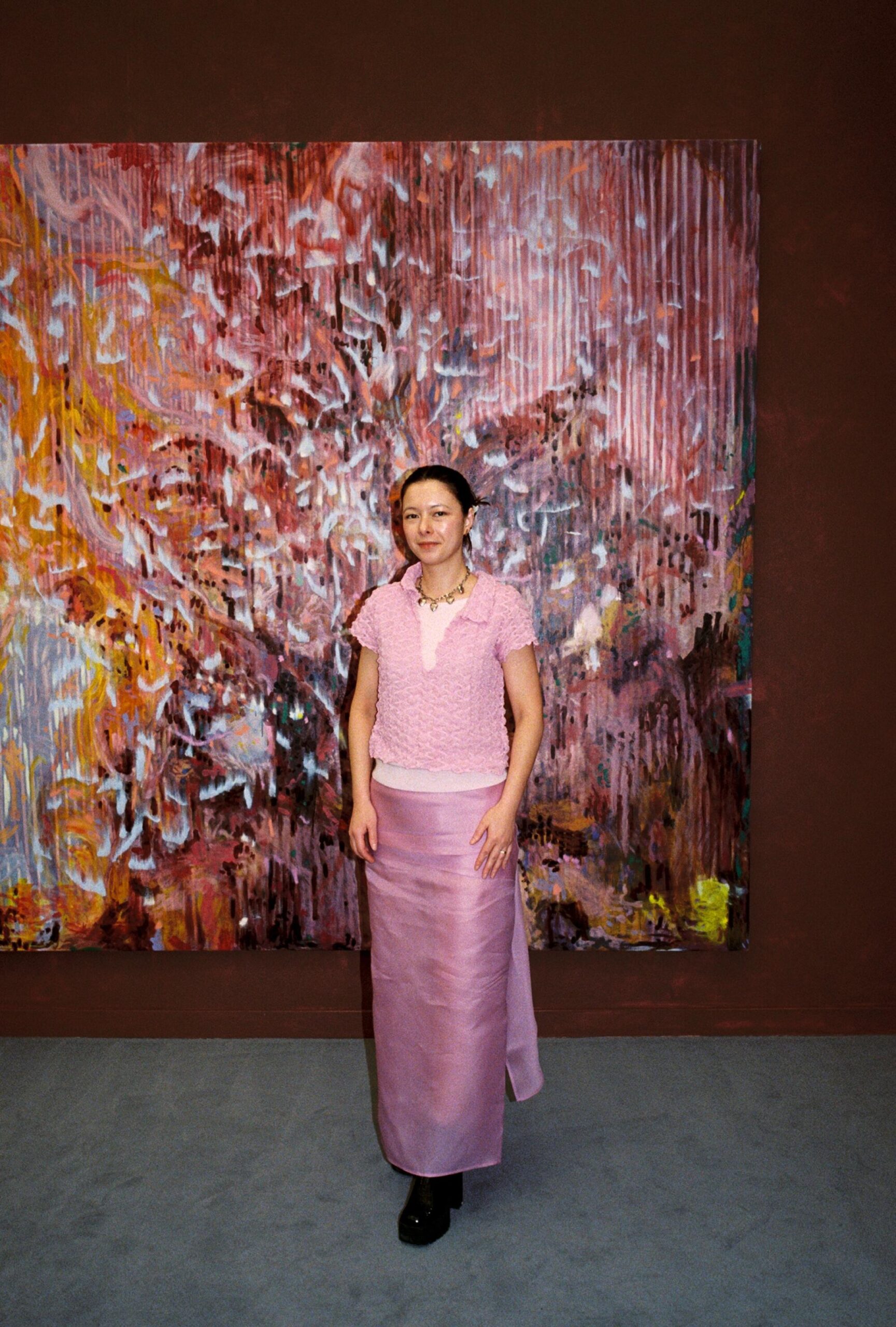The fashion and art at Frieze L.A., captured in photos

Erica Mahinay, showing with Make Room Gallery at Frieze L.A.
Some art shows are not just about the art. At Frieze L.A., it’s also about seeing — and being seen.
On Thursday morning, over 100 artists, gallerists and collectors representing 24 countries wafted into the maze that is Frieze at the Santa Monica Airport and transformed the space into a winding runway. The dress code was eclectic and appropriately L.A.: hyper-curated and nonchalant. Archival Mugler was paired with reconstructed relaxed denim. Silk pajama pants slouched over Wales Bonner loafers. And much like the works on display, attendees dared to be visually undefinable.
This year, the four-day frenzy is expected to draw about 30,000 attendees to exhibitions both in and outside the tent, including public installations from Frieze Projects’ “Body & Soul,” and the Focus section curated by Essence Harden, which spotlights young and lesser-known artists.

Storm Ascher, left, founder of Superstition Gallery and Greg Ito pictured with his solo booth, “A Cautionary Tale,” in the Focus Section curated by Essence Harden.


Undeniably, the art this year is a product of now. Outside, Patrick Martinez welcomes guests with neon quotes supporting immigrant rights. Across the tent, in a display of performance art, Amanda Ross-Ho continuously pushes a giant, inflatable Earth around a soccer field, symbolic of “the labor it takes to just keep things going all the time.” Walking around the fair, a shared sentiment of post-fire rejuvenation, cultural collaboration and a pride for the Los Angeles community was deeply felt.


Angeleno and artist Sharif Farrag said he’s “excited to show in the city [he] grew up in.” His ceramic collection “Hybrid Moments” with Jeffrey Deitch is a cultural analogy for his childhood. “I hope my work can reflect the times we’re in through a lens of color,” he said, “and the flora and fauna of L.A.”

Nicole Reber, an L.A.-based real estate agent, was giving “’90s sparkle princess,” coupling a pair of Chanel loafers with a vintage Escada jacket that’s “highly underrated.” She came to Frieze to scope out the next addition to her home. “There’s something valuable about living and collecting art,” she said. “It’s a chance to live with somebody else’s energy.”

Dr. Joy Simmons wore a calf-length button-down by South African designer Thebe Magugu. Collecting art, like clothes, is her way of exploring the diaspora. “I just want to find something that’s different,” she said. “[African American artists] bring a different kind of color palette and excitement to the art world.”

Sharon Coplan Hurowitz came to Frieze with her “support animal, ‘Hector.’” The pebble grain Thom Browne shoulder bag, though, was no size comparison to the 10-foot John Baldessari sculpture she stood in front of. Coplan, who recently authored a catalog of Baldessari’s notable art, is excited to see support for his archival works.


Nevine Mahmoud sculpture at Sebastian Gladstone Gallery
Sebastian Gladstone, owner of namesake New York and L.A. galleries, said he loves the L.A. art community because it brings together “people that would never mix otherwise.” If he could describe “good” art in a sentence, it would be: “an alchemy where there’s a mystery of its creation, and how it makes you feel.”

Kibum Kim, partner at the Commonwealth and Council gallery

rafa esparza at Commonwealth and Council booth
Kibum Kim, a partner at the Commonwealth and Council gallery, said sifting through Frieze is like making “Sophie’s choice.” He wore a jacket from Jakarta-based brand Tanah le Saé, adorned with mixed-matched buttons. In a similar spirit of upcycling, his exhibition shows Rose Salane’s newest project from Pompeii featuring rocks and other ephemera taken from the historic site.

William Escalera, left, and Francisco George
Francisco George, a longtime art collector and docent at LACMA, is a Frieze regular. To him, good art “grabs your attention and keeps it. It communicates.” He visits the fair with his husband, William Escalera, who this year is looking for art that incorporates textiles. “It’s different,” he said.

Gallerist Susanne Vielmetter
Gallerist Susanne Vielmetter layered an Issey Miyake Pleats Please dress with a skirt from J.Crew underneath. At Frieze, she never knows whether it’s going to be cold or hot in the tent. “It’s an onion look,” she said. Although she is particularly excited to display paintings by Alec Egan, depicting the trauma of the Palisades fire, she is glad that the fair is bustling and joyous. “People are just done with doom and gloom,” she said. “They’re positive, they’re energetic, they want to go back to collecting.”


Shio Kusaka, left, and Jonah Wood




An artwork by Jade Guanaro Kuriki-Olivo, aka Puppies Puppies

Conny Maier wears a Healthy Boy Band tee and MISBHV biker shorts.


Jwan Yosef and Steven Galloway




Davida Nemeroff of Night Gallery


Soshiro Matsubara, showing with Bel Ami

Soshiro Matsubara, Bel Ami

Kelly Wall with her installation





